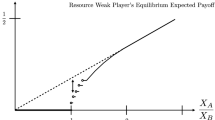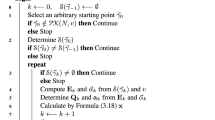Abstract
The payoff of each coalition has been assumed to be known precisely in the conventional cooperative games. However, we may come across situations where some coalitional values remain unknown. This paper treats cooperative games whose coalitional values are not known completely. In the cooperative games it is assumed that some of coalitional values are known precisely but others remain unknown. Some complete games associated with such incomplete games are proposed. Solution concepts are studied in a special case where only values of the grand coalition and singleton coalitions are known. Through the investigations of solutions of complete games associated with the given incomplete game, we show a focal point solution suggested commonly from different viewpoints.
Similar content being viewed by others
References
Chateauneuf, A., & Jaffray, J. Y. (1989). Some characterizations of lower probabilities and other monotone capacities through the use of Möbius inversion. Mathematical Social Sciences, 17, 263–283.
Choquet, G. (1953). Theory of capacities. Annals de Ifinstitut Fourier, 5, 131–295.
Driessen, T. S. H., Khmelnitskaya, A. B., & Sales, J. (2012). 1-concave basis for TU games and the library game. Top, 20, 578–591.
Gilboa, I., & Schmeidler, D. (1994). Additive representations of non-additive measures and the Choquet integral. Annals of Operations Research, 52, 43–65.
Harsanyi, J. C. (1963). A simplified bargaining model for the \(n\)-person cooperative game. International Economic Review, 4, 194–220.
Honda, A., & Okazaki, Y. (2008). Axiomatization of Shapley values of Fagle and Kern type on set systems. Journal of Advanced Computational Intelligence and Intelligent Informatics, 12, 409–415.
Housman, D. (2001). Linear and symmetric allocation methods for partially defined cooperative games. International Journal of Game Theory, 30, 377–404.
Kopelowitz, A. (1967). Computation of the kernels of simple games and the nucleolus of cooperative games as locuses in the strong \(\epsilon \)-core. Research Memo. 31. Jerusalem: Department of Mathematics, Hebrew University.
Pawlak, Z. (1991). Rough sets. Theoretical aspects of reasoning about data. Dordrecht: Kluwer.
Polkowski, L., & Araszkiewicz, B. (2002). A rough set approach to estimating the game value and the Shapley value from data. Fundamenta Informaticae, 53, 335–343.
Schmeidler, D. (1969). The nucleolus of a characteristic function game. SIAM Journal on Applied Mathematics, 17, 1163–1170.
Shafer, G. (1976). A mathematical theory of evidence. Princeton: Princeton University Press.
Shapley, L. S. (1953). A value for \(n\)-person games. In H. Kuhn & A. Tucker (Eds.), Contributions to the theory of games II (pp. 307–317). Princeton: Princeton University Press.
Tanino, T. (2006). On dividends for cooperative games. RIMS Kôkyûroku, 1484, 5–15.
Von Neumann, J., & Morgenstern, O. (1953). Theory of Games and Economic Behavior. Princeton: Princeton University Press.
Willson, S. J. (1993). A value for partially defined cooperative games. International Journal of Game Theory, 21, 371–384.
Author information
Authors and Affiliations
Corresponding author
Rights and permissions
About this article
Cite this article
Masuya, S., Inuiguchi, M. A fundamental study for partially defined cooperative games. Fuzzy Optim Decis Making 15, 281–306 (2016). https://doi.org/10.1007/s10700-015-9229-1
Published:
Issue Date:
DOI: https://doi.org/10.1007/s10700-015-9229-1




